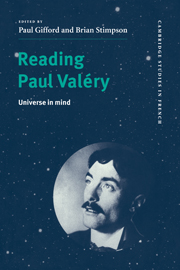Book contents
- Frontmatter
- Contents
- Contributors
- Abbreviations
- Introduction
- PART 1 SELF-SCIENCE
- PART 2 SELF-WRITINGS
- 6 The poetics of practice and theory
- 7 ‘Esprit, Attente pure, éternel suspens …’: Valéry's prose poetry
- 8 Counter-fiction
- 9 The Dialogues and Mon Faust: the inner politics of thought
- 10 Major poems: the voice of the subject
- 11 Other voices: intertextuality and the art of pure poetry
- 12 Manuscript steps: ‘Les Pas’
- PART 3 BODY, MIND, WORLD
- Conclusion
- Bibliography
- Index
- Cambridge Cultural Social Studies
11 - Other voices: intertextuality and the art of pure poetry
Published online by Cambridge University Press: 04 August 2010
- Frontmatter
- Contents
- Contributors
- Abbreviations
- Introduction
- PART 1 SELF-SCIENCE
- PART 2 SELF-WRITINGS
- 6 The poetics of practice and theory
- 7 ‘Esprit, Attente pure, éternel suspens …’: Valéry's prose poetry
- 8 Counter-fiction
- 9 The Dialogues and Mon Faust: the inner politics of thought
- 10 Major poems: the voice of the subject
- 11 Other voices: intertextuality and the art of pure poetry
- 12 Manuscript steps: ‘Les Pas’
- PART 3 BODY, MIND, WORLD
- Conclusion
- Bibliography
- Index
- Cambridge Cultural Social Studies
Summary
If the presence of other poets' voices in the work of Paul Valéry has gone largely unheard or unacknowledged, it may be because his poems are composed in such a way as to seem the embodiment of what Valéry occasionally referred to as ‘pure poetry’: resistant forms bound by a law of internal necessity so strong that they appear to be ‘absolute objets’. Mallarmé's poems represented for Valéry the supreme example of such ‘purity’ (Œ, i, p. 639).
The determination to ward off any attempt to read his work from a perspective outside of itself is reflected in Valéry's metaphor of poetry as dance, in the importance he attaches to voice as the origin and essential vehicle for lyric expression, and in his strong redefinition of influence as a radical modification of the mind, one that guarantees the singularity of the creator. In ‘Lettre sur Mallarmé’ he writes: ‘Le développement séparé d'une qualité de l'un par toute la puissance de l'autre manque rarement d'engendrer des effets d'extrême originalité’ (Œ, i, p. 635). One of his most celebrated images for the ‘originality’ that emerges from genuine influence implies the destruction and reconstitution of the predecessor work: ‘Rien de plus original, rien de plus soi que de se nourrir des autres. Mais il faut les digérer. Le lion est fait de mouton assimilé’(Œ, ii, p. 478).
- Type
- Chapter
- Information
- Reading Paul ValéryUniverse in Mind, pp. 187 - 199Publisher: Cambridge University PressPrint publication year: 1999

